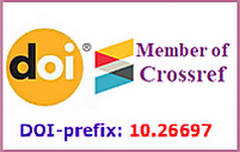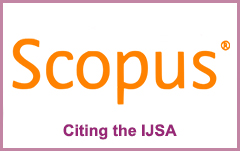Therapeutic Competencies in Reducing Emotional and Social Distress after Cognitive Behavior Therapy Training Program
Sabra Zizi E. I. 1, Daigham Abdelmohsen I. 2
| 1 Fayoum University, Egypt 2 Minia University, Egypt |
Abstract
This study is interested in investigating how cognitive therapy training could help school psychologists to offer better help for students known with emotional and social problems. School psychologists are capable to help students with their psychological problems, as they spend relatively long time with them and know about their strengths and weaknesses as well. Adjustment in school environment is very important and has a great impact on student's overall adjustment and psychological health. Cognitive behavior therapy is known as an effective treatment for many of the psychological problems. Training could enhance cognitive behavior therapy skills and enable those psychologists to help students to cope with their emotional and interpersonal problems. Supervision is essential in learning cognitive behavior therapy. Despite the divergence in systems of psychotherapy, their goals and varied training practices, supervision remains the one component considered essential to all. This paper addresses the question: is a brief cognitive behavior therapy (CBT) training program enhances psychologist's skills as reflected in scores on Cognitive Therapy Skills scale and in helping students with emotional and social problems.
Keywords
cognitive behavior therapy (CBT), emotional problems, social problems, CBT skills, cognitive therapy scale (CTS).
References
Beck, A. T., Baruch, E., Balter, J. M., Steer, R. A., & Warman, D. M. (2004). A new instrument for measuring insight: The beck cognitive insight scale. Schizophrenia Research, 68(2), 319–329. doi:10.1016/S0920-9964(03)00189-0
Beck, A. T. (1993). Cognitive therapy: Past, present, and future. Journal of Consulting and Clinical Psychology, 61(2), 194–198. doi:10.1037/0022-006X.61.2.194
Beck, A. T. (2005). The current state of cognitive therapy: A 40-year retrospective. Archives of General Psychiatry, 62(9), 953–959. doi:10.1001/archpsyc.62.9.953
Beck, A. T. (1997). The past and future of cognitive therapy. The Journal of Psychotherapy Practice and Research, 6(4), 276–284.
Kazantzis, N., Clayton, X., Cronin, T. J., Farchione, D., Limburg, K., & Dobson, K. S. (2018). The cognitive therapy scale and cognitive therapy scale-revised as measures of therapist competence in cognitive behavior therapy for depression: Relations with short and long term outcome. Cognitive Therapy and Research, 42(4), 385–397. doi:10.1007/s10608-018-9919-4
Kühne, F., Lacki, F. J., Muse, K., & Weck, F. (2019). Strengthening competence of therapists‐in‐training in the treatment of health anxiety (hypochondriasis): Validation of the assessment of core CBT skills (ACCS). Clinical Psychology & Psychotherapy, 26(3), 319–327. doi:10.1002/cpp.2353
Kühne, F., Meister, R., Maaß, U., Paunov, T., & Weck, F. (2020). How reliable are therapeutic competence ratings? Results of a systematic review and meta-analysis. Cognitive Therapy and Research, 44(2), 241–257. doi:10.1007/s10608-019-10056-5
Muse, K., & McManus, F. (2013). A systematic review of methods for assessing competence in cognitive-behavioural therapy. Clinical Psychology Review, 33(3), 484–499. doi:10.1016/j.cpr.2013.01.010
O’Donovan, A., Halford, W. K., & Walters, B. (2011). Towards best practice supervision of clinical psychology trainees. Australian Psychologist, 46(2), 101–112. doi:10.1111/j.1742-9544.2011.00033.x
Information about the authors:
Sabra Zizi Elsayed Ibrahim – https://orcid.org/0000-0001-8329-9615; Doctor of Philosophy in Psychology, Associate Professor, Department of Psychology, Faculty of Arts, Fayoum University, Fayoum, Egypt.
Daigham Abdelmohsen Ibrahim – https://orcid.org/0000-0001-6253-0005; Doctor of Philosophy in Psychology, Associate Professor, Department of Psychology, Faculty of Arts, Minia University, Minia, Egypt.
| |
Cite this article as:
APA
Sabra, Z. E. I., & Daigham, A. I. (2020). Therapeutic Competencies in Reducing Emotional and Social Distress after Cognitive Behavior Therapy Training Program. International Journal of Science Annals, 3(1), 55–56. https://doi.org/10.26697/ijsa.2020.1.7
Harvard
Sabra, Z. E. I., & Daigham, A. I., 2020. "Therapeutic Competencies in Reducing Emotional and Social Distress after Cognitive Behavior Therapy Training Program". International Journal of Science Annals, [online] 3(1), pp.55–56. viewed 30 June 2020, https://culturehealth.org/ijsa_archive/Vol._3,ijsa_No_1,_2020-7.pdf
Vancouver
Sabra Z. E. I., Daigham A. I. Therapeutic Competencies in Reducing Emotional and Social Distress after Cognitive Behavior Therapy Training Program. International Journal of Science Annals [Internet]. 2020 [cited 30 June 2020]; 3(1):55–56. Available from: https://culturehealth.org/ijsa_archive/Vol._3,ijsa_No_1,_2020-7.pdf https://doi.org/10.26697/ijsa.2020.1.7












